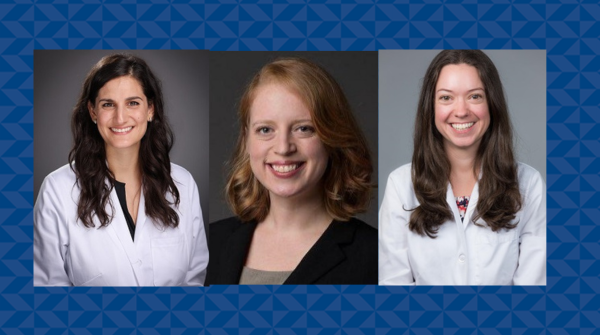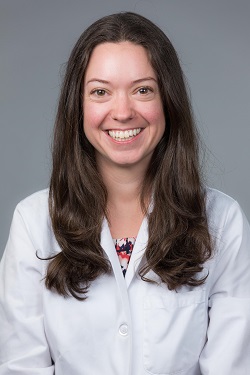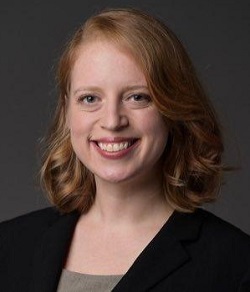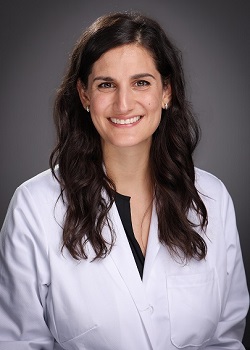
The Duke University Department of Medicine (DOM) supports junior investigators in training as they transition to independent scientists planning for their first extra-mural funding. Strengthening the next generation of outstanding investigators in a significant focus of the DOM Research Strategic Plan.
The Mario Family Foundation Award supports this mission by annually awarding selected patient-oriented research proposals to fund for one year. This year’s Mario Family Foundation fellow recipients are Judith B. Vick, MD, MPH, General Internal Medicine, Josephine Harrington, MD, Cardiology, and Naseem Alavian, MD, MPH, Infectious Diseases.
Josephine Harrington, MD
Fellow, Cardiology
Josephine Harrington, MD, is an advanced heart failure and transplant fellow. She attended medical school at the University of Massachusetts Worcester before going to the University of Texas Southwestern for her residency. Dr. Harrington completed her cardiology training at Duke, including two years at the Duke Clinical Research Institute (DCRI) on a T32 grant. Her clinical and research interests are focused on identifying better methods to care for patients with heart failure and obesity.

As a fellow, Dr. Harrington piloted a clinic to provide care for patients whose body mass index (BMI) was a barrier to heart transplant; multiple of her patients have gone on to successfully lose weight and receive heart transplants. Her research has similarly focused on understanding the relationship between obesity and markers of heart failure severity, and on the impact of weight loss in patients with heart failure and obesity. She is an avid hiker and loves good food and bad puns.
Project: The Relationship Between Obesity, Weight Loss and Heart Failure Severity
Q: Please describe your most significant research work and why you are excited about it.
Harrington: Despite the fact that obesity is the single largest risk factor for heart failure, we know shockingly little about the ways that excess body weight impact heart failure physiology, or how intentional weight loss might ameliorate those relationships. I am leveraging the incredibly rich data that already exist at Duke to establish baseline relationships between obesity and heart failure, and to explore the impact of intentional weight loss on changes in those relationships. Intentional weight loss may well represent a new “pillar” for heart failure management among patients with obesity, and these data will help to establish the potential for weight loss to impact heart failure severity in this population.
Q: What has a Duke School of Medicine education meant to you in preparing for your career as a physician and/or researcher?
Harrington: Duke is truly unparalleled when it comes to resources and chances for collaboration and research. Rarely a week goes by where I don’t realize that there is yet another opportunity to further a research question or to leverage a dataset to inform an investigation.
Q: We live in a fascinating time for moving medicine forward. How do you foresee contributing to medicine that will improve the health and well-being for all populations?
Harrington: The median BMI in the United States continues to climb, and a “normal” BMI is no longer the most prevalent BMI category. There is a tremendous need to improve care for patients with obesity and comorbid diseases, especially heart disease, which remains the number 1 comorbidity of patients with obesity. I hope that my work will directly inform care for patients with obesity and heart failure, and will help to set new standards in management for this vulnerable population.
Judith B. Vick, MD MPH
Fellow, General Internal Medicine
Judith Vick, MD, MPH, is an internal medicine physician, a health services researcher, and a fellow in the National Clinician Scholars Program at Duke and the Durham VA. She is a graduate of Barnard College and completed her MPH and MD at Johns Hopkins, after which she completed residency in the Johns Hopkins Osler Medical Residency. Clinically, she works as a hospitalist.

In her research, Dr. Vick is interested in structural and system-level approaches to optimize decision making for older adults and their families in the acute care setting, with a specific focus on persons with cognitive impairment. She leads projects related to the use of critical care services for older adults with dementia, the roles of family members in the delivery of hospital care for older adults, and shared decision-making in the hospital. She enjoys group workouts, creative nonfiction, and is writing a series of prose poems tentatively titled “Texts from my Ma.”
Project: Ethnography of Family Involvement in Care in Hospitalizations of Older Adults
Q: Please describe your most significant research work and why you are excited about it.
Vick: My long-term goal is to design and implement system-level interventions to optimize decision-making for hospitalized older adults with cognitive impairment and improve the delivery of value-concordant care. One path to this may be through better involving family members with the health care team during hospitalizations. Most family caregiving research, including my own prior work, has occurred in the outpatient realm where over 30 million family members and friends provide roughly 30 billion hours of care every year. There has been less attention to the ways that families are involved when a patient is hospitalized. I am excited to develop the research in this area through a hospital ethnography of family member involvement during hospitalizations of older adults with cognitive impairment supported by the Mario Family Foundation.
Q: What has a Duke School of Medicine education meant to you in preparing for your career as a physician and/or researcher?
Vick: Duke’s rich intellectual environment has been wonderful. I am so grateful for Duke’s smorgasbord of educational opportunities and the many creative faculty and trainees here doing exciting work to improve health care delivery. I’ve felt very supported at Duke and feel fortunate to receive so much attention, feedback, and mentorship from faculty and my co-fellows alike.
Q: We live in a fascinating time for moving medicine forward. How do you foresee contributing to medicine that will improve the health and well-being for all populations?
Vick: My research interests stem from challenges that I see occurring in my clinical work, where there are many barriers to the delivery of patient- and family-centered care. I hope that my research has a real-world impact making our health care system better at meaningfully engaging with our patients and their families in all settings of care.
Naseem Alavian, MD, MPH
Fellow, Infectious Diseases
Naseem Alavian, MD, MPH, is a third-year fellow in the division of Infectious Disease and a health services researcher. She completed her medical school training at the University of Maryland School of Medicine concurrent with a master’s degree in public health at Johns Hopkins Bloomberg School of Public Health. She completed a medicine-pediatrics residency at Baylor College of Medicine.

Dr. Alavian, was an assistant professor at the University of North Carolina within the division of Hospital Medicine prior to her training at Duke. She is interested in using data science to create and implement innovative strategies to improve disease management in patients living with HIV. Dr. Alavian, her spouse, and two children love hiking, kayaking and spending time outdoors.
Project: Identifying predictors of care engagement among persons living with HIV
Q: Please describe your most significant research work and why you are excited about it.
Alavian: Currently, I am engaged in research aimed at optimizing care engagement among individuals living with HIV. For persons with HIV (PWH), optimal and longitudinal engagement in HIV clinical care, along with access to life saving antiretroviral therapy (ART) is essential.
Unfortunately, many PWH fall out of care leading to increased morbidity and mortality for the individual and increased risk of HIV transmission to others. The long-term goal of the research in which I am currently engaged is to develop a patient-centered program addressing risk factors for falling out of care and encouraging reengagement.
As a part of such efforts, our team aims to develop an integrated partnership between our academic health system and the local health departments to improve retention in care activities in our region. By increasing retention of persons with HIV on life saving therapy, we will reduce HIV morbidity and mortality and work toward reducing new HIV incidence and ending the HIV epidemic through treatment as prevention, a priority goal of the National Institutes of Health.
Q:What has a Duke School of Medicine education meant to you in preparing for your career as a physician and/or researcher?
Alavian: I have been grateful for robust clinical and research mentorship from passionate, skilled, and dedicated faculty at Duke. The Interdisciplinary Research Training Program in AIDS (IRTPA T32) at Duke has offered the opportunity to collaborate with researchers across multiple disciplines to broaden my skill set and enrich my research efforts.
As an early-stage investigator, it has been valuable to have research mentors that ground their effort on clinical outcomes, attuned to patient need and aligned with addressing the social determinants that impact health outcomes.
We live in a fascinating time for moving medicine forward. How do you foresee contributing to medicine that will improve the health and well-being for all populations?
Alavian: I am excited about utilizing data science and clinical informatics to optimize the HIV continuum of care, the steps or stages that people with HIV go through from diagnosis to achieving and maintaining viral suppression. Advances in data science and machine learning methods open up the opportunity to detect complex relationships within electronic medical record data, including identifying HIV care patterns and predicting risk for virologic failure or care disengagement. Our team is exploring ways to leverage data science and machine learning to improve HIV prevention and care engagement. The outcomes of this research hold potential to further the innovative use of artificial intelligence addressing the HIV continuum of care.
About the Mario Family Foundation
Dr. Ernest and Mildred Mario founded the Mario Family foundation, a private charitable organization, in 1997. Dr. Mario, a native of New Jersey, served on the Duke Board of Trustees, and he was chairman of the Duke University Health System board of directors. He was named Trustee Emeritus of Duke University in 2007, and is the second longest serving trustee in the school’s history. He was awarded The University Medal in 2009, Duke’s highest recognition of service to the school.